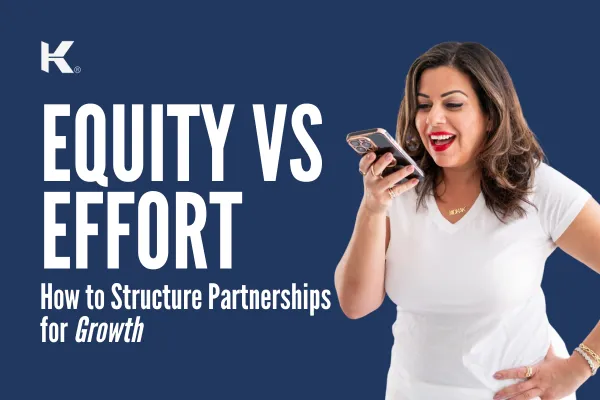
Equity vs Effort: How to Structure Partnerships for Growth
One of the biggest reasons business partnerships break down has nothing to do with strategy, product, or even market fit.
It’s equity.
More specifically, it’s the mismatch between equity and effort.
I’ve worked with countless founders who split ownership evenly because it “felt fair” at the start. But when effort isn’t equal, resentment builds, and it can crush the business before it ever has a chance to scale.
The Equity Myth: Why Equal Splits Can Be Unequal
At the beginning of a new venture, splitting equity evenly feels simple and safe. Everyone is excited, everyone is hopeful, and no one wants to have the hard conversations.
But when one partner is putting in full-time effort while another is part-time or distracted by another commitment, problems surface fast!
When Equal Equity Didn’t Equal Effort
I once worked with three partners who launched a consulting business. They split equity evenly. Within a year, two were working full-time in the company, and one was still juggling another job.
The two full-time partners were carrying the business. The third was receiving equal payouts without equal contribution. Resentment set in, and the partnership almost collapsed.
Sound familiar?
Fortunately, they were conscious enough to ask for help because what they were doing was not working for them, and they did not want to abandon the partnership just because it wasn’t set up right from the start. They also wanted to make sure that now that they had traction, the growth of their business would not be hindered by resentment or misunderstanding.
They hired me to help negotiate, mediate, educate, and propose how best to move forward based on the main challenges they were having, and also to plan for the future as they scale. Below is something each founder needs to understand when they are discussing equity and effort across all potential partnerships.
Equity vs Effort: What Needs to Align
Equity isn’t just about ownership. It’s about contribution.
Here’s what needs to be factored into the equation:
Effort: Sweat equity — the time and energy you put in, aka your operating role.
Equity: Financial equity — the capital you invest and the percentage of return when there is an event in the business that financially impacts the status of your company. Examples: a sale, a distribution, an additional partner added.
When equity ignores effort, resentment is guaranteed. And resentment is a blocker to the ability to sustain and scale your business.
The Role Alignment Factor
This is where my Creator, Entrepreneur, Operator framework helps bring clarity.
Creators contribute vision, product design, and innovation.
Entrepreneurs contribute revenue, partnerships, and market traction.
Operators contribute systems, delivery, and execution.
When you know your role, equity and compensation discussions become clearer. You can tie ownership and payment to the actual needs of the business, rather than assumptions or emotions.
A Simple Framework: Define → Align → Revisit
Here’s the process I recommend to every client:
Define roles clearly. Who owns vision, who drives revenue, who builds the system? Put it in writing.
Align equity with effort. Equal equity doesn’t always mean equal pay. Compensation should reflect the time, money, and expertise invested.
Revisit regularly. Roles shift as businesses grow. Equity and compensation should evolve to reflect reality.
It may feel uncomfortable, but clarity now prevents conflict later.
Diagnostic Checklist: Do You Have an Equity vs Effort Problem?
Ask yourself:
One partner is part-time but owns the same as full-time partners.
Resentment is growing about workload or pay.
Roles and compensation haven’t been revisited since the business launched.
If you said “yes” to any of these, it’s time to realign.
FAQs About Equity and Effort in Partnerships
What is a fair way to split equity in a business partnership?
There’s no one-size-fits-all answer. A fair split considers sweat equity, financial investment, unique expertise, and leadership roles.
Can sweat equity replace financial investment?
Yes, but only if it’s clearly defined. Sweat equity should be valued in relation to hours, skills, and milestones, ensuring all partners agree on its worth.
What happens if one partner isn’t pulling their weight?
Compensation and equity should be revisited. If expectations aren’t met, the partnership agreement should define what happens next.
How do you balance equity and effort in a startup?
Start by mapping roles and time commitment. Then decide how equity and pay reflect that. Revisit regularly as the business grows.
Explore This Deeper with Hey Kareen® AI
I’ve trained my AI clone with 20+ years of coaching experience so you can explore these ideas in real time.
Here are some prompts to ask my Kareen AI:
Hey Kareen, how do I decide if my partnership should split equity evenly?
Hey Kareen, what’s the best way to compensate a part-time partner fairly?
Hey Kareen, how do I handle resentment when a partner isn’t pulling their weight?
Hey Kareen, how do I restructure my partnership to be fair for all regarding equity and effort?
Your Next Steps
Take the CEO Quiz. If you haven’t yet, start here. In minutes, you’ll know if you’re a Creator, Entrepreneur, or Operator, and how that impacts your contribution. 👉 Take the quiz now
Join my FREE Monthly CEO Call. Every month, I coach entrepreneurs live on scaling, partnerships, and leadership alignment. 👉 Save your spot here
Engage with my AI Clone. Get instant answers to your partnership and leadership questions. 👉 Start here
Download the Hey Kareen® App. Continue the personal growth that will translate to your leadership.
Partnerships don’t fail because of bad ideas. They fail because of unspoken expectations.
When equity and effort are aligned, your business can grow without resentment, and your partnership can thrive for years to come.

